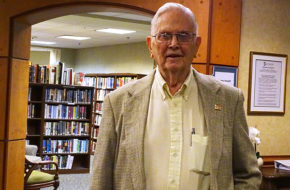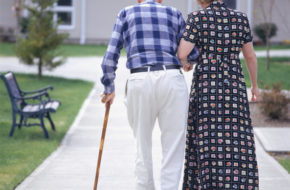Editor’s Note: In recognition of Veterans Day, Diakon held events at senior living communities honoring the dedication and service of residents who served in the military. The following post is a compilation of comments made by one of the residents interviewed at the events.
See our eDiakonnect article for more photographs and stories about other military Veterans.
In addition, a link to news about the events is listed at the conclusion of this post.
“As far as we could see, there were American and English ships and boats, then planes going back and forth bombing the French Coast,” Richard Schermerhorn recalls of his time on the English Channel June 6, 1944.
“As we got closer, naval ships started opening up the big guns.”
Welcome to D-Day, when the Allied invasion of Normandy at Omaha Beach turned the tide in World War II with Operation Overlord, the largest seaborne invasion in history. The day became the springboard for the liberation of German-occupied France and set the bedrock for the Allied victory on the Western Front.
“As we got closer, the water was over my chin,” says Richard, 97, and a current resident of Luther Crest, a Diakon senior living community in Allentown, Pennsylvania. Richard remembers seeing the bodies of many troops on the beach as he and another soldier operated a mine detector, one of them sweeping and one of them probing. Later, as they worked by a road, they saw a one-star general approaching.
The officer was Gen. Theodore Roosevelt Jr., son of the former president of the same name.
“‘Are you finding many mines, boys?’ he asked. At the time, we had not. He was like on a picnic and this was the biggest invasion we’d ever gotten into!”
Richard recalls that paratroopers had arrived during the night, one landing on the roof of a church, Sainte-Mère-Église. The paratrooper, John Steele, survived, and today a replica of a paratrooper hangs from the church spire in commemoration of the event.
“Our main objective was to establish a beachhead, making it safe so more troops and supplies could come in.”
Richard then transferred to the combat engineer outfit and spent the rest of the war in Germany, “sweeping mines and blowing things up.”
He was a part of the effort to cross rivers to bring supplies, but not over the Elbe River. “That was the biggest river. We never crossed it because Russia had taken Berlin.”
The war over, Richard found himself in France awaiting transportation home when he was sent to a contiguous area of Germany. The country had been partitioned into four zones and Richard had to get American equipment out so that the French could come in. He also spent some time in Salerno, Italy.
Richard recalls that he enlisted in Syracuse, New York, in 1942, but was allowed to finish his college semester, reporting for regular duty in 1943 and serving until Jan. 1, 1946.
“I was a corporal when I went over and was busted to a private,” Richard laughs, “for talking to the Germans.” He had accompanied a friend, another soldier, on a visit to the soldier’s girlfriend in the Rhineland during a blackout night. Richard concluded his service as a private first class.
“I wanted to go to Jack Dempsey’s in New York City” on his first peacetime New Year’s Eve, “but you couldn’t move in the streets. It was so crowded, everyone was hugging each other; it was crazy.”
Richard married after the war and had a son; however, his wife died when their son was 10 months old. Three years later, he remarried and had a son and four daughters, one of whom has since passed away. His wife died two years ago; he has many grandchildren and great-grandchildren.
Today, he also faithfully attends nearby Nativity Lutheran Church and helps with worship each Sunday afternoon at Luther Crest.
To read news of the Veterans Day celebrations, click here.



